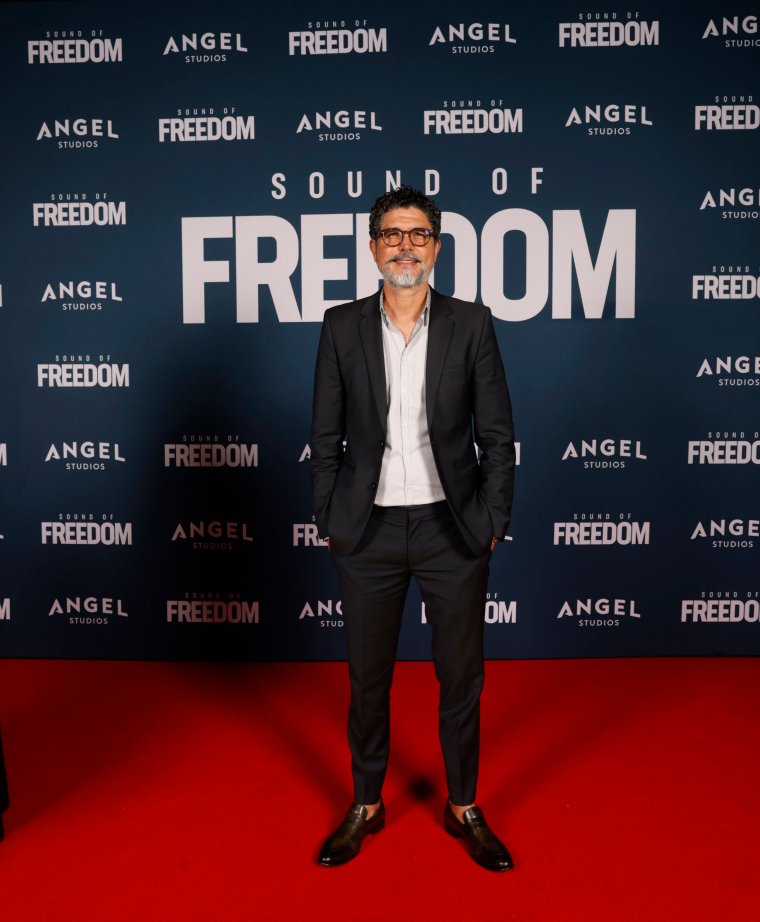How Donald Trump and QAnon conspiracists turned Sound of Freedom into a blockbuster
If you were to watch Sound of Freedom, the Mexican director Alejandro Monteverde’s new film about child trafficking, without any prior investigation, you may not notice anything untoward.
It’s a goodies-and-baddies action-thriller about the evils of human trafficking, presented in horror-movie format (the first few scenes contain a child singing an eerie song, some creepy-looking dolls and a police raid, and are undercut with something’s-afoot silence). Though it is an indie with a budget of $14.5m, its box-office numbers in North America – where it was released on 4 July – are impressive: it has made $183m, more than Tom Cruise’s latest instalment of Mission: Impossible. It is the highest-grossing indie since the 2019 South Korean Oscar winner Parasite.
Yet, judging by the controversies swirling around the film, things are not all they seem. Since its release, the film has been associated with the right-wing conspiracy movement QAnon – the baseless theory that a cabal of Satanic paedophiles are trafficking children to harvest their blood for the chemical adrenochrome, which they believe is an elixir of youth.
Claims of the film’s affiliations are rooted mainly in the fact that, in 2021, its star Jim Caviezel – who plays Tim Ballard, a real former federal officer who was involved in solving numerous child trafficking cases over a period of 12 years – spoke at a QAnon-affiliated event in Oklahoma about the “adrenochroming of children”.
More recently, on the promotion circuit for the movie, he said on Steve Bannon’s podcast that “there is a big storm coming” – a known QAnon proverb.

Though Caviezel has said that he “never knew about [QAnon]” while making Sound of Freedom, and that “it has nothing to do with our film”, the film has nevertheless been picked up by the movement and pushed heavily on its forums. It is a community closely tied to Donald Trump: QAnon’s original – and, again, baseless – claims involved members of the Democratic Party being part of the cabal; Trump’s followers believe that he is waging a secret battle against them. In July, Trump himself put on a screening of Sound of Freedom at a Trump National golf club in New Jersey. “This is a very important film and very important movie and it’s a very important documentary all wrapped up in one,” he wrote in an email to attendees.
The film’s director, Monteverde, has baulked at its links to QAnon. In an interview with Variety, he described the press coverage surrounding the film’s associations as “heartbreaking” and said that he wanted to “hide”. He began writing the film, he said, in 2015, two years before QAnon existed.
The film has had a long, tortuous journey to the big screen. It was first optioned by Fox, which was then bought by Disney in 2019, which shelved it during Covid. Then it was bought by the Christian production house Angel Studios. It was because of them that the film ended up with its “special message” at the end, in which Caviezel speaks directly to camera and implores viewers to “forward-purchase” tickets for people who might not otherwise see it, using a QR code that pops up on screen – which might explain why, according to anecdotal reports in the US, “sold-out” theatres were actually almost empty.
While Monteverde was inspired to make the film after he saw a particularly upsetting news story about child trafficking, the project soon morphed into the telling of a more specific tale: that of Tim Ballard. Ballard was so dedicated to the cause of extraditing trafficked children that he left the federal forces, where there were restrictions surrounding which territories they could infiltrate, and in 2013 set up his own non-profit organisation, Operation Underground Railroad (OUR), which has undertaken a number of high-profile stings to save enslaved children from traffickers (though as of this year, he is no longer part of the organisation).

Monteverde met Ballard shortly into the development of the project and obtained his life rights. Though the film is fictionalised, many of the events are based on real life, including Ballard’s posing as a sex tourist in Cartagena, Colombia, pretending to set up a luxury sex hotel in order to rescue more than 50 children and frame a group of traffickers.
To play him, Monteverde hired Caviezel. Both Ballard and Caviezel were in attendance at Trump’s screening, while Monteverde said he had “to keep [his] distance”.
The right-wing press has rallied against reports that Sound of Freedom is anything but a well-meaning film about the very real and horrific abuse that takes place at the hands of human traffickers. There is no mention of adrenochroming, organ-harvesting or Satan worship in the movie, only sad-eyed, hungry-looking children being whisked to safety in Caviezel’s muscular arms. Fox News described it as “the movie the media tried to kill”, while multiple YouTube videos, including one by Valuetainment watched almost seven million times, scream: “Why Hollywood Elites Don’t Want You to Watch Sound of Freedom”.
It’s less a question of “trying to kill” the movie, and more one of pointing out the ways in which, even aside from its participants’ associations, it plays into insidious tropes.
“Our job,” says Ballard at the start of the film, “is to get the paedophiles, and that’s it” – a worthy aim, but arguably a rather reductive summary of the trafficking webs that exist in reality. There is a revealing line that “if we do nothing it’s going to spread” – a warning, perhaps, that the “cabal” is taking over the world, with “spreading” being typical conspiracist language that stokes fear about a kind of nebulous evil rather than making people engage meaningfully with the issue of child trafficking and abuse.
Alt-right groups love an idol, and Sound of Freedom has that, too. In a movie that set out to be about the horrors of child sex abuse and slavery, it’s remarkable how much it actually centres on Ballard the Ubermensch. Though you may not have heard of him, in the film his reputation precedes him: his first rescuee blinks up at him and says, “You save kids, right?”
The saviour role is not new to Caviezel. His most significant past credit was, fittingly, Jesus Christ, in Mel Gibson’s 2004 film The Passion of the Christ (Gibson is also an executive producer here).

Male protectiveness and heroism is everywhere in this film, promoting images of the conservative ideal – white, male, Christian, American – antidote to evil.
A major problem is that, save for a few choice images of the children’s squalid conditions, there is very little engagement with the actual misery of the victims, making it difficult for what should be an affecting film to move you at all.
At the centre of the plot is Rocio, a girl whom Ballard seeks to track down after he rescues her brother. Of course we feel sympathy for her – but the focus shifts repeatedly back to him, and the men who surround him on his mission.
Ballard’s OUR, on which the film’s military heists are based, also came under scrutiny in 2016-17, including by human-trafficking expert Anne Gallagher. OUR’s high-profile raids – actual footage of which is shown at the end of Sound of Freedom – were said to have contributed to victims’ trauma. In a 2015 essay, Gallagher described its operations as “arrogant, unethical and illegal”.
(OUR has issued various responses to criticism over the years, including in 2021 to an article in Slate by a former sting participant, saying: “OUR remains laser-focused on our mission to help rescue and protect victims… bring their perpetrators to justice, provide survivors with life-saving aftercare services, and raise awareness of this worldwide scourge.”)
Trafficking experts have also criticised the film itself, saying that promoting “rescue” tactics can put victims in danger, and that the film is reductive in its depictions of human trafficking.
Regardless of its original intentions, Sound of Freedom’s adoption by QAnon taints the end product.
The “spread” we should be worried about is misinformation that ultimately leads people away from addressing the real problem.
Sound of Freedom is in UK cinemas from 1 September



